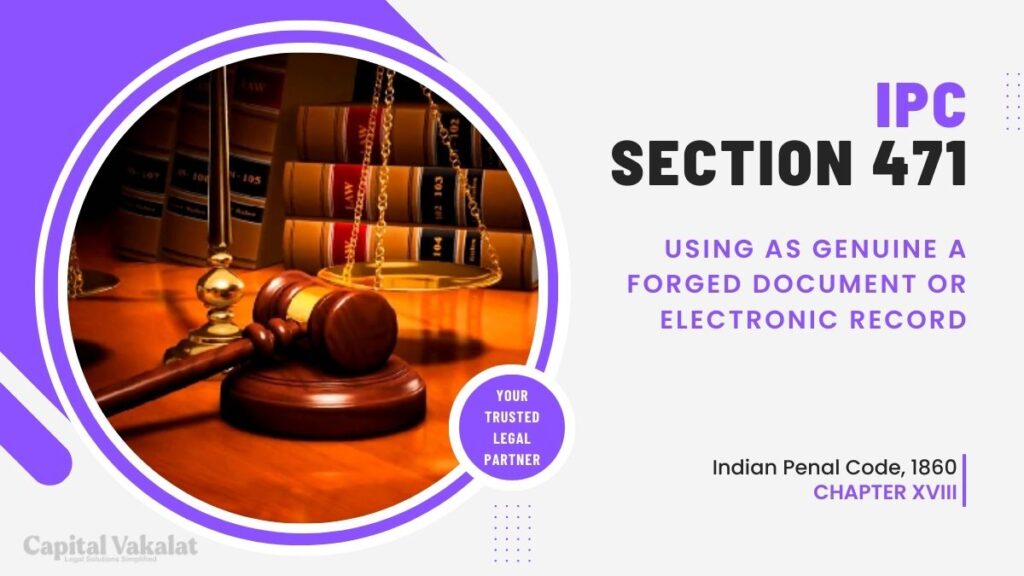In the realm of legal intricacies, Section 471 of the Indian Penal Code (IPC) stands as a sentinel against the deceptive use of forged documents or electronic records. This section delves into the act of presenting or using as genuine any document or electronic record known to be forged.

As our society strides further into the digital age, the implications of such offenses have evolved, bringing forth challenges that demand a careful examination of legal frameworks and technological advancements.
Understanding Section 471 IPC
Section 471 of the IPC serves as a bulwark against the dishonest use of documents, emphasizing the importance of maintaining the integrity of records. This section stipulates severe consequences for individuals who knowingly use forged documents or electronic records with the intent to deceive. The essence lies in upholding the credibility of information, a cornerstone in the administration of justice.
Forgery in the Digital Age
With the digital transformation sweeping across industries, the concept of forgery has transcended the traditional realm of physical documents. Electronic records, once considered impervious to manipulation, now face new threats in the form of sophisticated cybercrimes. As we navigate this era of technological advancement, it becomes imperative to explore the intricacies of forgery in both physical and digital dimensions.
Key Elements of Section 471 IPC
Breaking down Section 471 IPC, it becomes evident that the elements constituting an offense go beyond mere possession of a forged document. The law demands a deliberate intent to use such documents or records as genuine. Understanding these nuances is crucial in comprehending the gravity of the offense and the legal ramifications that follow.
Real-world Examples
To comprehend the real-world impact of Section 471 IPC, we can turn to notable cases where individuals or entities faced legal consequences for using forged documents. These instances not only shed light on the severity of the offense but also underscore the importance of stringent legal measures in combating document forgery.
Technology and Document Authentication
In a bid to stay ahead of forgers, technology has played a pivotal role in enhancing document authentication. From blockchain to biometrics, innovative solutions are emerging to safeguard the integrity of documents and electronic records. Exploring these technological advancements is crucial in understanding how the legal system adapts to the challenges posed by the digital landscape.
Legal Consequences and Penalties
Section 471 IPC doesn’t treat document forgery lightly. The legal consequences are severe, ranging from fines to imprisonment. Analyzing the penalties prescribed under this section provides insights into the commitment of the legal system to deter individuals from engaging in deceptive practices that compromise the veracity of information.
Challenges in Prosecution
While the legal framework aims to curb document forgery, challenges persist in prosecuting offenders. Establishing intent and proving the authenticity of documents can be daunting tasks. Examining these challenges is crucial in identifying areas for improvement within the legal system.
Preventive Measures
Prevention is undeniably better than cure, especially in matters of document forgery. Individuals and businesses alike need to adopt robust measures to avoid falling prey to deceptive practices. From thorough document verification processes to embracing emerging technologies, a proactive approach can mitigate the risks associated with forged documents.
Conclusion
In conclusion, Section 471 IPC serves as a linchpin in maintaining the sanctity of documents and electronic records. As we navigate an era where information is increasingly digitized, the implications of using forged documents as genuine extend beyond individual transgressions to societal trust and the administration of justice. Balancing legal measures with technological advancements is pivotal in ensuring that Section 471 remains a potent deterrent against deception.
Frequently Asked Questions
How has technology impacted the prevalence of document forgery?
Technology has both facilitated document forgery through sophisticated means and provided tools for robust document authentication. The battle between forgers and technology continues to evolve.
Are there specific industries more susceptible to document forgery in the digital age?
Industries dealing with sensitive information, such as finance and healthcare, are particularly vulnerable. However, document forgery can occur in any sector.
What role does cybersecurity play in preventing electronic record forgery?
Cybersecurity is crucial in safeguarding electronic records. Encryption, secure access controls, and regular security audits are essential components in preventing electronic record forgery.
Is the punishment under Section 471 IPC uniform for all cases?
No, the punishment varies based on the severity of the offense. Factors such as the nature of the document, intent, and the impact of forgery influence the legal consequences.